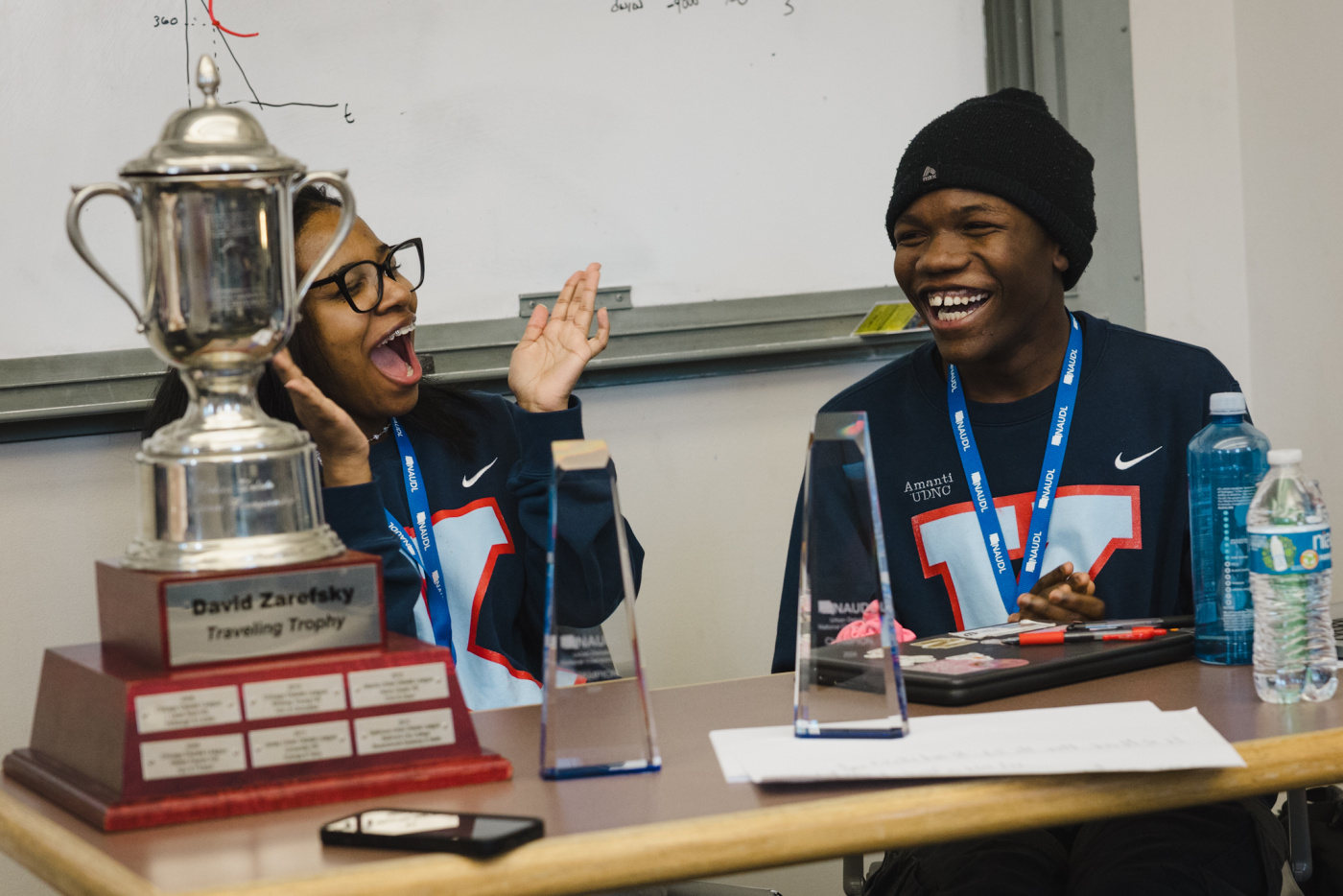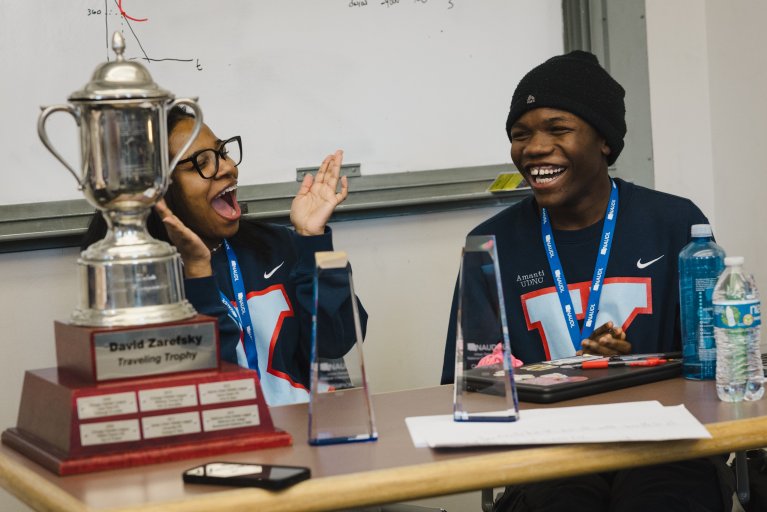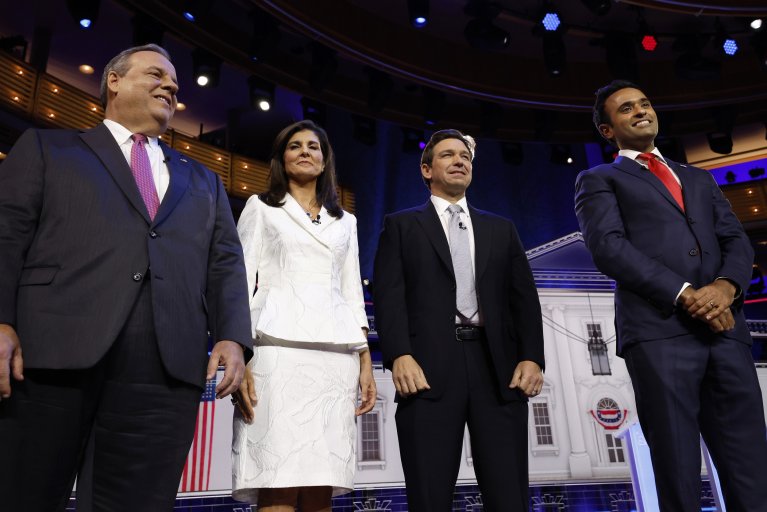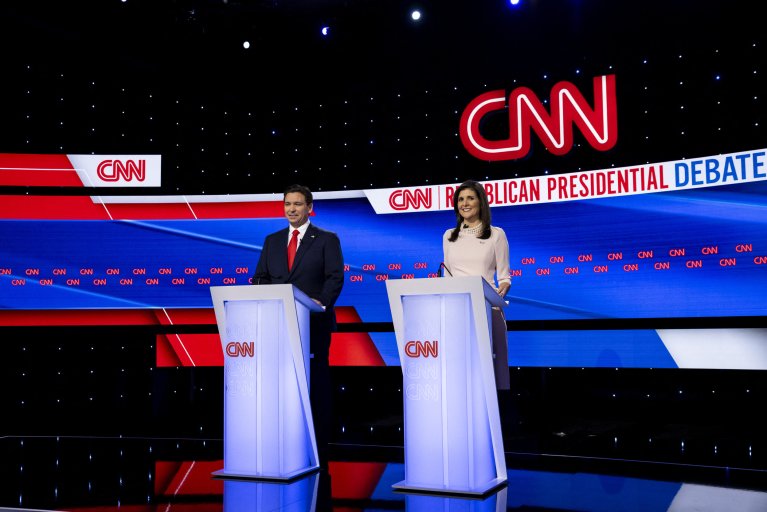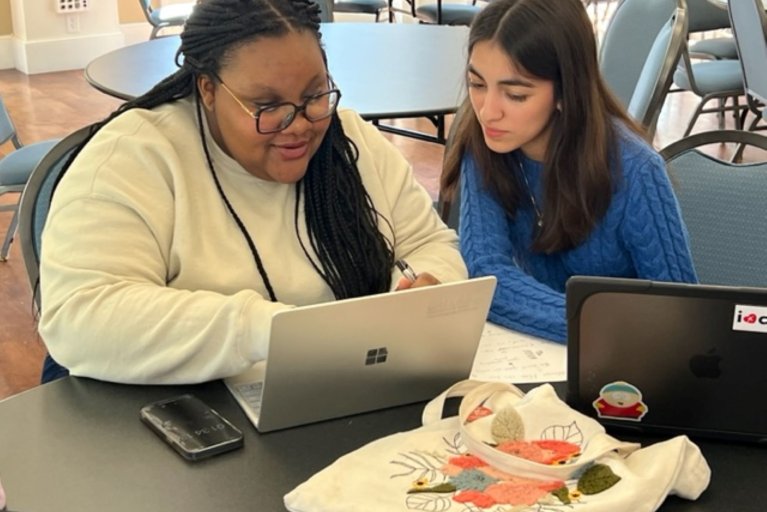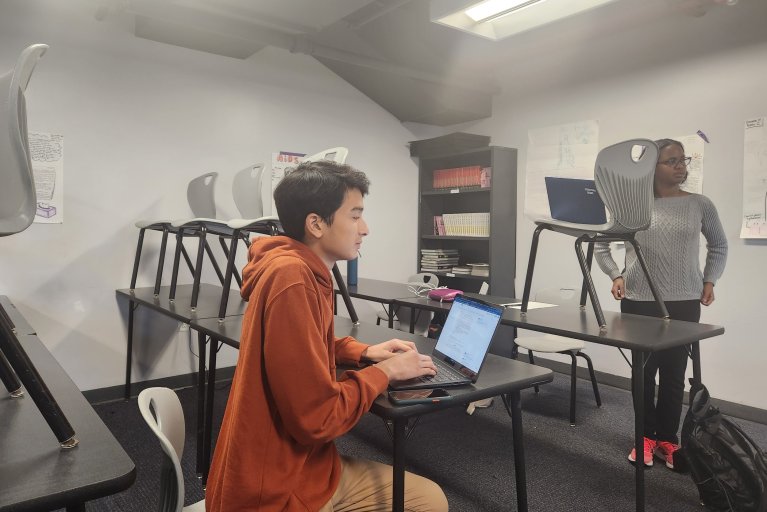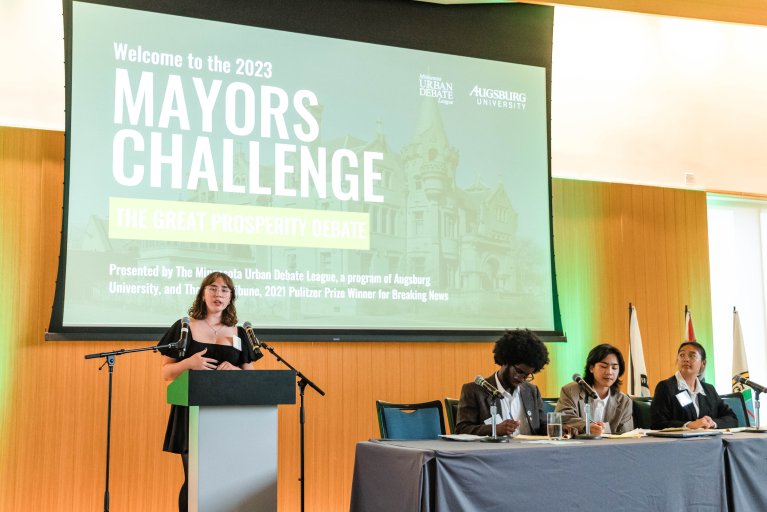Apr 26, 2024 At 11:41 AM EDT
Over the weekend, the wind blowing in from Lake Michigan spread the sweet smell of blooming hyacinths across Northwestern University's campus.
As a number of students walked to class on a beautiful spring day and filed into their lecture, the sound of lively discussions about U.S. economic policy and social systems filled a room nearby. What they heard was not a high-level theory class, but rather a group of passionate and well prepared high school debaters.
In Evanston, Illinois, this past weekend, high school policy debate teams from across the country gathered for the Urban Debate National Championship (UDNC) hosted by The National Association for Urban Debate Leagues (NAUDL).
The national tournament is the capstone of the season for NAUDL's 22 debate leagues—a season that may include both local and national circuit competitions. In total, 37 teams from 19 leagues gathered on Northwestern's campus for the three-day tournament, which ran from Friday, April 12, through Sunday, April 14.
Students spend the entire year debating the same topic. With each event happening throughout the calendar, teams build and refine their arguments in preparation for nationals. This year's resolution, or statement up for debate, was: "The United States federal government should substantially increase fiscal redistribution in the United States by adopting a federal jobs guarantee, expanding Social Security, and/or providing a basic income."
Last year's competition was the first in-person UDNC tournament since the COVID-19 pandemic pushed the event fully remote. But inclement weather delayed the final round and forced teams to debate over Zoom days later.
This year, however, the final two teams—Los Angeles Metro Debate League's Huntington Park High School and Chicago Debate's Kenwood Academy High School —were able to debate for the David Zarefsky Trophy in front of a large crowd of NAUDL peers.
Senior Daniel Medina and junior Desire Delgadillo of Huntington Park took the Affirmative position, proposing a plan discussing universal basic income and restructuring social security to help undocumented Mexican immigrants. On the Negative side, Kenwood's Bianca Perkins, senior, and Amanti Washington, junior, challenged the affirmative's arguments by bringing in theory and literature concerning the experiences of Black Americans.
Medina was named the top speaker at the tournament. Washington and Delgadillo earned second and third place, respectively, and Perkins finished in tenth place.
In a 4-1 decision, the Kenwood team was named champions. All four finalists also received a $5,000 Boies Schiller Flexner Scholarships, courtesy of the law firm Boies Schiller Flexner LLP, to help with education costs.
For Perkins, this win feels "bittersweet."
"This was my last tournament, so it's good to end on a high note," Perkins said. "But it's also kind of sad because debate was so much of my life for so long. I lost my first year of high school to COVID and so immediately after I returned back sophomore year, I sought out community in the debate team. And so it's been really transformative for me."
While the NAUDL season has concluded, Washington, Medina and Delgadillo will all attend the Tournament of Champions—the most prestigious high school debate tournament in the country—next weekend in Lexington, Kentucky.
Washington said he was surprised they won because Huntington Park "is a very good team."
"The 2AR [second affirmative rebuttal] was really good, but I'm glad we did what we needed to do to win," he said. "And some of Bianca's stuff really helped us out in the end and I'm really thankful for that."
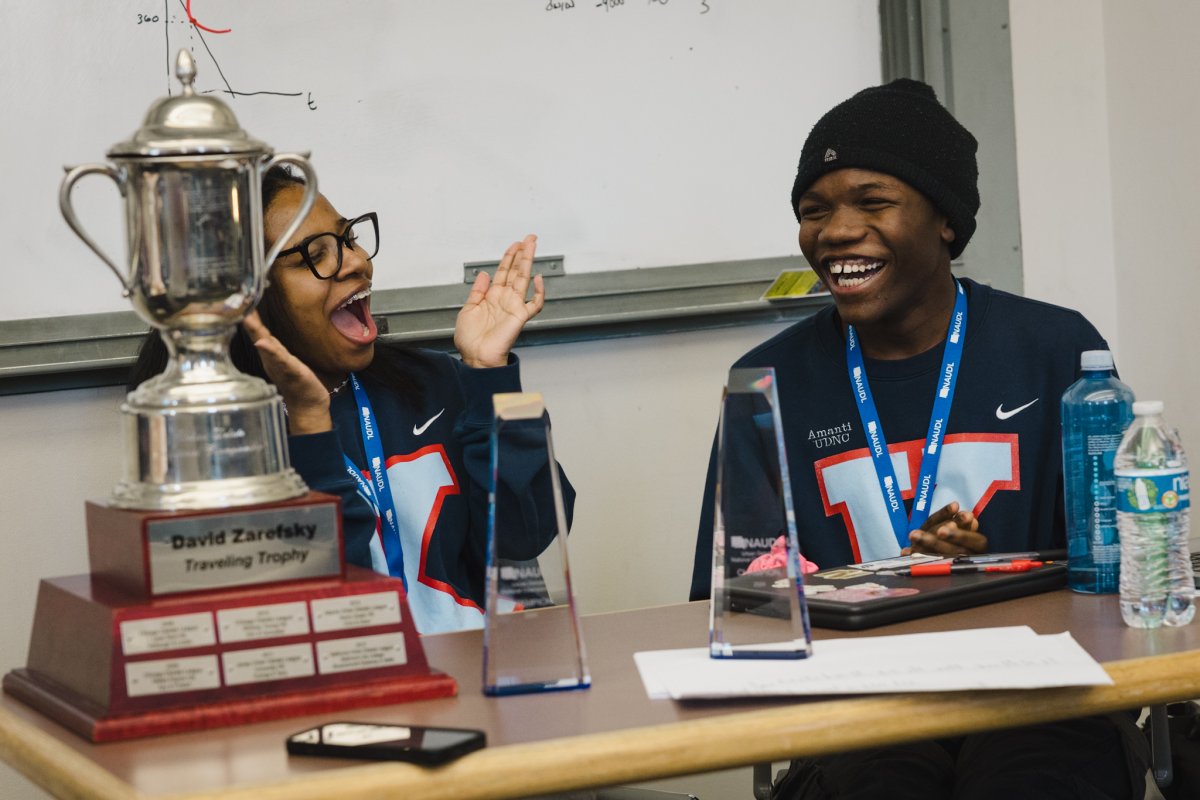
Each round leading up the finals showcased the dedication and hard work of each student debater. Early each morning, teams arrived on campus, eagerly awaiting for pairings to be published, so they could find out who they would face in the next round. As soon as the Tabroom notifications sounded, the teams rushed to read up on judge paradigms, study their opponent's cases and prepare their arguments.
Time is a precious commodity at debate tournaments—starting a round even a few minutes late can set the entire tournament back, delaying both the collection of the round's results and the publication of the next pairings. For each round, a coin flip determines which of the two teams will argue the affirmative and which will argue the negative position. Teams must be prepared to argue both positions.
St. Paul Central High School's Max Ulven and Kiernan Baxter-Kauf made it to the semifinals at this year's tournament. Ulven said the pair focused on the fundamentals of their arguments, "rather than thinking about highly technical things."
"Going into a tournament like this, with a ton of different skill levels, is a lot better for the research because you go through so many different arguments from across the country that you don't have to do at [local] tournaments," Baxter-Kauf added.
Once the debates began, students took turns showcasing their research, public speaking, persuasion and critical thinking skills before a judge. Debaters spoke about current political issues facing Congress and the White House and proposed ways to reorganize economic policies and reform social systems. They stood at portable podiums or upside-down trash cans on desks, reading evidence off laptops, many of which featured an array of stickers from their leagues, debate camps and the occasional internet meme.
Opposing teams weren't the only adversaries students faced. Frozen screens, spotty WiFi and problems with email chains caused moments of minor panic during rounds.
For the 74 debaters at the UDNC, the tournament is about more than winning. Participating in debate, and especially a NAUDL tournament, instills a sense of purpose and community and helps develop other invaluable skills that students will carry over into their lives beyond debate.
Debaters who compete at the national circuit often note that the camaraderie found at NAUDL events is more enjoyable for students and helps to relieve a bit of their stress.
"With NAUDL, you're more in a community of other UDLs and it's more fun to get to actually connect with those people," St. Paul Central's Baxter-Kauf said. "There [are] fun little activities and competitions, it just makes it a better experience."
During the tournament, there were various mini-competitions for debaters to participate in, like a sticker exchange with other leagues and a social media contest.
While all teams participating in the UDNC are united as urban debate leagues, each league within the NAUDL system does debate differently.
"[The UDNC] is a collection of different debate styles which I think is really fun because coming from Kansas, it's a very technical policy-heavy kind of [debate]," said Isaac Lainez, a senior from Sumner Academy of the Arts and Science in Kansas City. "Something I really appreciate about NAUDL is the diversity in terms of positions."
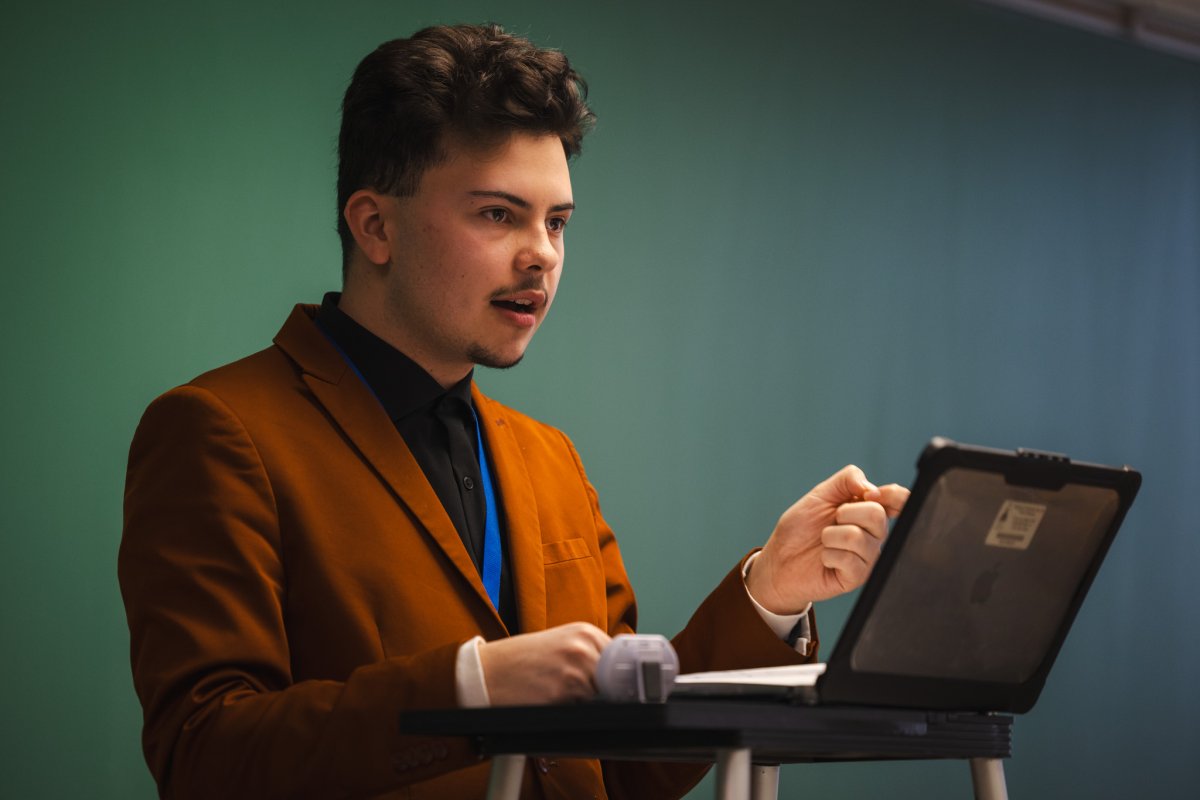
Catherine Cheng and Amy Zhang, both juniors at White Station High School, came all the way from Memphis, Tennessee, to compete, finishing 1-5 in the preliminary rounds.
The Metro Memphis Urban Debate League serves schools that are relatively under-funded and more restricted in what they can debate compared to other UDLs, due to state anti-Critical Race Theory laws. White Station's coach, Curt Rakestraw, said that every year, the competition at the UDNC opens his eyes to the lack of resource in Tennessee.
"The gap between us and other schools in our city is pretty big and we come to something like this [tournament] and we see what some of the most elite schools in the country look like and it's just night and day [in terms of] the resources and stuff we get," he said.
In Memphis, Zhang said, teams focus strictly on case and do not debate kritiks or topicality. But the debaters said with each round at the UDNC they learn something new. Zhang added that debating other leagues helps with her ability to adapt quickly, noting that she and Cheng picked up new debate terms from opponents.
"We learned what a 'permutation' was in the second round [Friday] and we used it semi-successfully during rounds [Saturday]," she said.
(In policy debate, the Affirmative side will argue permutation, or "perm," to demonstrate that both their plan and the Negative's counterplan can happen, proving that the two actions are not mutually exclusive.)
The impact of debating on Northwestern's campus was not lost on these debaters. Northwestern's debate program is one of the most successful in the country, having won 15 national titles, the most of any school. At the opening ceremony of the UDNC, Northwestern Debate Director Daniel Fitzmier spoke to the room full of high school debaters, encouraging them to use him as a resource if they plan to apply to and debate at the school.
Fitzmier, who has been the debate director since 2008, told Newsweek that Northwestern is very involved in the Chicago Debates—noting that many Northwestern debaters volunteer at UDL tournaments and the university hosts a summer debate institute called Chicago Scholars.
And that's a wrap on rounds for #udnc24! Willy the Wildcat is eager to see you all at the awards ceremony this evening and to see who will be named our 2024 National Champion!#whyidebate #whydebate pic.twitter.com/PgyRVagvyU
— NAUDL (@NAUDL1) April 13, 2024
"Aside from recruiting and getting the next generation of students at Northwestern to be engaged, we look for any of these opportunities where we can act as a bridge between what our students' interests are and the various leagues," Fitzmier said. "That's kind of a self-reinforcing cycle where the more engaged our students are, the more likely it is that the next generation of kids will develop a meaningful relationship with them and maybe be judged by them at tournaments over the course of the years."
Rhonda Haynes notes that Northwestern "has a very strong history in debate," but also that it shows the debaters what they can achieve.
"Northwestern is an elite university and not everyone has the chance [to apply]," she said. "I hope students get to see what is possible and they get to see that they belong. It means a great deal to be able to leverage relationships we have at a number of universities so that students get exposure. This may not be the place where many of them choose to go, but it's a place where they do belong. And I love for them to see themselves on any college campus."
As the tournament wrapped up Sunday, teams were reflective about their runs and what they can do better next year. These moments are a reminder that debaters should not linger on the mistakes or failures of the previous round because they need to prepare for the next debate.
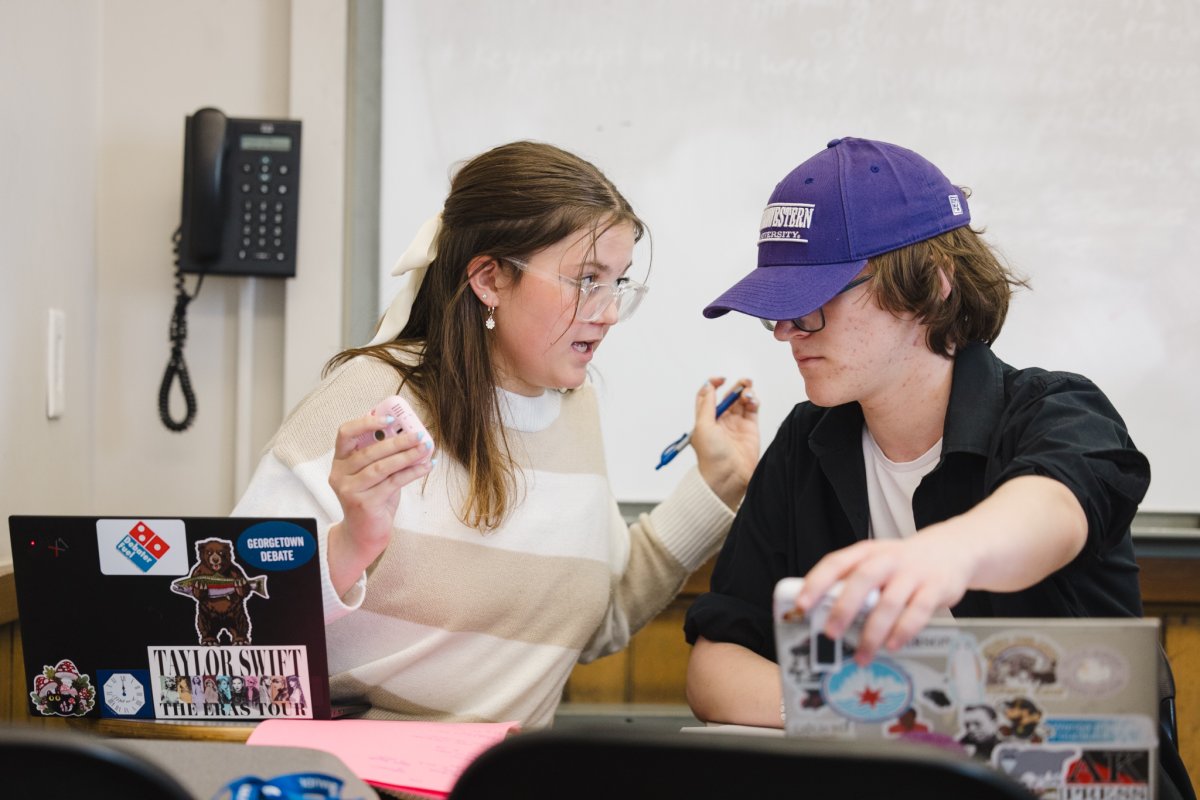
Despite losing to Huntington Park in the semifinals, the St. Paul Central team are looking ahead to the future.
"We have the opportunity to grow next year and do better," Ulven said. "I think next year, we're looking forward to researching a new topic. We're trying to travel more as a [debate team] and get even more exposure."
For the NAUDL staff, Haynes said they're always trying to grow and do better.
"One of my favorite parts of the tournament is the informal conversations that I get to have," she said. "It's a great chance for me to do a pulse check and I learned things. My background is in engineering and so I'm a huge proponent of continuous improvement, it is baked in my blood and my spirit. And so each year, there's something that that I glean, and that we take forward to another year."
Next year's Urban Debate National Tournament will be held at Emory University in Atlanta, Georgia. Students from across the country will debate the 2024-2025 national policy topic that focuses on intellectual property rights.
Updated 04/26/2024, 11:40 am ET: This story has been updated to include additional information about the scholarships offered to UDNC finalists.


